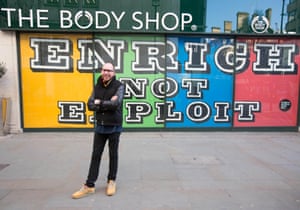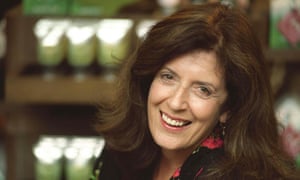Body Shop boss goes back to the rainforest – The Guardian
Jeremy Schwartz crossing a tributary of the Amazon in Brazil. Photograph: PR Company Handout
Anita Roddick was never an everyday entrepreneur and the Body Shop business, which she founded 40 years ago this year, was never a conventional company.
Back in the have-it-all 1980s of Margaret Thatcher and yuppies, Roddick was a hippy chick running a right-on ethical beauty company. She railed against what she saw as the misery created by body and beauty fascism, and campaigned loudly on multiple causes – from saving whales to freeing Black Panther activists. She trekked to rainforests and Nigerian villages to champion the rights of indigenous people and the environment, and to seek out local beauty secrets.
Ten years ago, however, Roddick shocked her fans by selling out to L’Oréal, the world’s biggest cosmetics maker.
Body Shop remains a vast international business – with more than 3,000 stores in 65 countries – but faces far more competition than when it started out, from more upmarket ethical brands such as Dr Hauschka and Chantecaille, plus British rivals Lush and Neal’s Yard.
But now the chain is hoping to revive the spirit of Roddick, who died in 2007, with environmental and community-minded initiatives designed to put it back at the forefront of ethical business.
The man with the plan could not be more different to Roddick. Jeremy Schwartz, who took over as chief executive of The Body Shop in 2013, is a corporate man with a CV that stretches from management consulting to marketing roles at L’Oréal, Coca-Cola, Sainsbury’s, News International and back to L’Oréal.

Street artist Ben Eine unveils The Body Shop’s ‘Enrich not Exploit’ commitment with a bespoke window at its Oxford Street store. Photograph: David Parry/PA
He intends to mix the latest technology – such as making packaging from plastic created using excess methane collected from farms and refineries – with ideas once championed by its founder. Roddick originally encouraged customers to return its trademark plastic bottles for refills, while Schwartz is planning a trial in which shoppers can return used plastic pots and see them turned into pellets for recycling in store.
“It’s a kind of Heath Robinson machine. I’m a bit worried about health and safety, but I hope it can work,” he says of the pellet-maker. The L’Oréal takeover gave Body Shop’s ethical image a knock, as the international cosmetics firm had been criticised for its record on animal testing before the Europe-wide ban came into force in 2009.
Roddick ensured that Body Shop’s own principles were protected under the terms of the takeover, and insisted she could be a “Trojan horse” who would be able to influence the new parent into adopting some of her ethical ideas.
Schwartz, like Roddick, is an adventurous type who has cycled across Tibet and hitch-hiked from Cape Town to Zimbabwe. He has also travelled to Borneo to check out palm oil plantations and visited Amazonian tribes by canoe to see for himself if it is possible to make a profit while protecting the planet.
He seems keen to take on Roddick’s mantle, returning to the UK with ideas for new ingredients that could be sustainably sourced from biodiversity hotspots that will both support locals and protect their environment.
Roddick’s ideas still make sense, he says, and are being accepted not just by L’Oréal but by many other multinationals. “The idea of a company that made money but is also a force for good was laughed at 40 years ago. That’s now mainstream … Lots of people are doing corporate social responsibility now, from BMW to Coke. They have copied us. Anita was a pioneer, but we can’t just say we are doing this [already]. We have to find a brand new thought.”

Anita Roddick, who founded the company 40 years ago. Photograph: Johnny Green/PA
He has therefore come up with a list of 14 targets for 2020, including ensuring all its natural ingredients are traceable and sustainably sourced, compared to just under half today, and that 70% of its packaging does not come from fossil fuels, compared to 30% today.
The company will report on progress annually and intends to bring in an independent body to verify how it is doing. There is also a new Body Shop catchphrase – Enrich not Exploit – and the chain also plans to double the number of “community trade” ingredients it sources, from 19 at present. The community trade programme deals directly with small-scale farmers and artisans promising them a fair, sustainable price and community support.
Other ambitious ideas include the creation of “bio bridges”, in which 75 million sq ft of habitat where forest has been cut away will be rejuvenated to create more sustainable habitat for wildlife. The first project in Vietnam will involve planting 500,000 trees – one square metre planted for every consumer who buys a relevant product. Schwartz says future areas for “bio bridges” might include the US, Indonesia, Sweden and Saudi Arabia.
One thing missing from the list is the kind of hard-hitting campaign Roddick championed. She backed Greenpeace’s Save the Whale mission, joined Amazonian indians in campaigning against a hydro-electric dam and supported the Ogoni people’s battle for reparations for damage to their local environment in Nigeria by oil multinationals.
Her stand against animal testing challenged the whole cosmetics industry to make changes that led to the European ban. Schwartz says Body Shop is still taking a stand, refusing to sell in China, for example, where any imported cosmetics must be tested on animals. The chain pulled out of airport duty-free stores there in 2014, after a consumer watchdog raised fears that Body Shop products could be randomly tested on animals by authorities.
Sales rose 10.7% to €967m (£750m) last year, but profits slipped back 16% to €54.8m as a result of investment in stores, digital marketing and developing new skincare products and services.
However, Schwartz thinks Body Shop’s links to local communities around the world will continue to power its growth. “We have discovered ingredients nobody is using and are developing products with those … I’m confident we have healthy competition but we’ll stay ahead,” he says.
![]()







